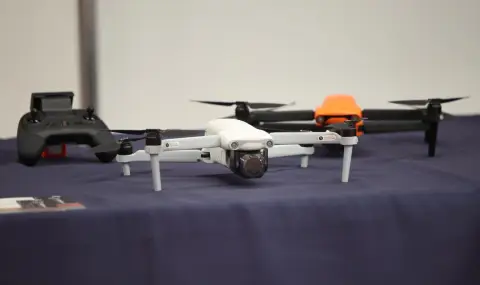Alexander Markov has been working in information technology for 40 years, but his true passion is flying. "In 2017, in June, on June 1, Children's Day, I bought my first drone. At first, it was just like that, to fly, then I started taking pictures, then I started learning to process what I had photographed", he says.
The dream come true led to the creation of the project "Interactive Map of Bulgaria". Markov travels to different corners of the country, filming the beauty of nature with a drone, then processes and publishes his videos online for free access, "Nova TV" specified.
"In the last few years, I have driven 300,000 kilometers around Bulgaria. I thought I knew Bulgaria back then, because I had traveled a lot, when I started flying the drone I realized that I didn't know anything and suddenly it turned out that there was so much to discover. Currently I have over 1000 points in Bulgaria with over 3000 films in them", shares Markov.
In order for the activities of people operating drones to be regulated and safe, new rules are being introduced. The Director General of the General Directorate "Civil Aviation Administration" – Anelia Marinova talks about them.
"You know that these changes were provoked by an event that we had at Sofia Airport – with an unregulated entry of an unmanned aerial system. The purpose of these changes is, on the one hand, to enable airport operators to take immediate measures in such situations. And the second, which is also very important – "We are introducing an additional measure through this amendment, we are introducing a new norm in the Criminal Code, so we qualify a threat to aviation as a crime under the Criminal Code," Marinova explains.
The authors of the legal changes refute the claims that we can go to prison for violating the rules for operating drones. "There is no way that a person can go to prison simply for violating the rules for piloting drones. The norm provides for criminal liability only in cases where aviation security is violated, when we have a real threat to an aircraft," Marinova specifies.
According to Markov, responsibility is key when using drones. "In my opinion, like everything in a person, common sense is needed. A person must be responsible for everything he does. When riding a bicycle, you must be careful not to push people on the sidewalk, when driving a car - even more so. When you fly a drone, although to an even lesser extent, you bear your responsibilities. You try to stay away from people, not to disturb anyone, not to intrude on their personal space," he says.
The General Directorate of the Civil Aviation Administration explains that there are two categories of drones with different rules for them, with drone operators subject to registration and training.
"The open category, the unlimited category - it implies operations with drones away from people or when it is close to people, there is a limit on the weight of the drones with which this can be done. And accordingly - operating drones away from people, outside populated areas, but again there is a weight limit - up to 25 kilograms of drone weight," explains Marinova.
According to Markov, the restrictions have their own meaning. "Everything is a double-edged sword. You can look at it this way or that way. The question is how it will be used and how it will be applied. What I have seen all over the world is that when there are serious measures, there is greater discipline and we like to shout: "Hey, the Germans are so strict". They are strict because there are serious measures. If you let them do whatever they want, they will do the same as our dzhigits", he says.
The drones of the "dzhigits" in the air will be shot down, and this can happen in different ways.
"In airport areas, we must always keep in mind that it must be applied very carefully - whether jamming the radio frequency spectrum, or other measures. The first step that airports will have to implement is detection, monitoring, and when there is a real danger to act and assess what measures to take," explains Marinova.
Markov supports strict measures for strategic sites, but believes that it is not necessary to impose draconian measures on amateurs. "I am completely "FOR" that measures should be tightened on some strategic sites where there is a danger, specifically of an attack, but I don't think it makes sense to take draconian measures on amateurs who are in the forest, the dam or somewhere far away and are taking pictures for fun," he says.
"All this is directed against violators, and violators who do it intentionally. For everyone else - we will, of course, encourage the further development of the technology and try to cooperate in every way," Marinova specifies.
The amendment to the Law has already been submitted to parliament and is expected to be considered in the plenary soon. "The texts are open to additional amendments, comments and suggestions," Marinova adds.
